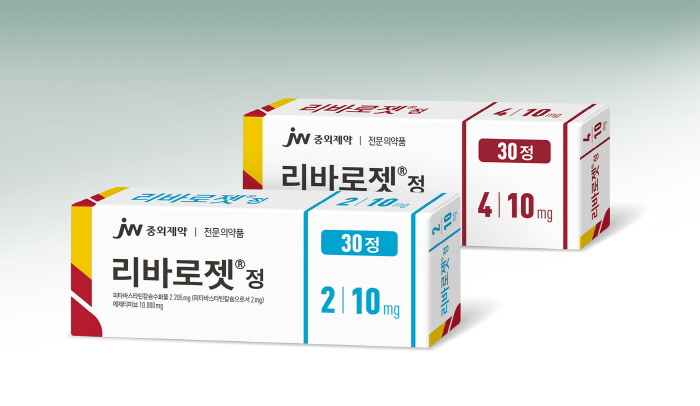Patients With Diabetes Caused Dyslipidemia Taking Long-Term Riboradet Confirms Improvement In LDL Cholesterol Levels Without Changes In Blood Glycemic
Oct 14, 2025
According to the guidelines for dyslipidemia by the Korean Association of Lipid and Arteriosclerosis, 86.4% of diabetic patients in Korea have dyslipidemia based on LDL-C levels of 100mg/dL. In particular, elevated triglycerides (TG) and decreased high-density lipoprotein cholesterol (HDL-C) are characterized in this patient group. Such lipid abnormalities lead to an increase in sd (small dense)-LDL-C that causes coronary heart disease, which requires active management.
JW Pharmaceutical said low-density lipoprotein cholesterol (LDL-C) levels were improved in the group of patients with diabetes among patients with dyslipidemia taking ribodet. Rivarodet is a two-drug complex that combines 'Pitavastatin' and 'Ezetimib', which are components that treat dyslipidemia, and is the first improved new drug in Korea that combines pitavastatin and ezetimib among statins.
A research team led by Professor Lim Soo of the Department of Endocrine Metabolism at Seoul National University Bundang Hospital is conducting a 'VICTORY Study' study to evaluate the effectiveness and safety of long-term riboradet use in 1,400 diabetic/non-diabetic patients among dyslipidemia patients.
The research team recently released the interim results of the study in the form of posters at the ICDM 2025 Fall International Conference of the Korean Diabetes Association.
The interim analysis involved 824 patients with dyslipidemia in Korea, of which 408 patients with type 2 diabetes and 416 patients with non-diabetic disease. Median LDL-C levels in the diabetic group decreased from 134 mg/dL before taking ribodet to 66 mg/dL after 48 weeks. The level of the non-diabetic patient group also improved from 159 mg/dL to 76 mg/dL, lowering the likelihood of cardiovascular disease regardless of whether it is accompanied by diabetes.
In particular, the median sd-LDL-C level in the diabetic companion group fell from 41.45 mg/dL before administration to 23.62 mg/dL after 24 weeks of administration. The non-diabetic patient group decreased from 47.00 mg/dL to 25.54 mg/dL. In addition, no significant changes in fasting blood sugar (FPG) were observed during the administration period, ensuring blood sugar safety even in diabetic patients.
Professor Lim Soo said "A significant number of diabetic patients in Korea are accompanied by dyslipidemia, and especially in situations where sd-LDL-C management is important, Rivarodet is a meaningful treatment option that has been confirmed to strongly lower LDL-C while also having blood sugar stability."This study can be a new clinical basis for lipid management in diabetic patients"
"Rivarodet is a drug that can reduce the burden of treatment on diabetics and contribute to safe management of dyslipidemia," a JW Pharmaceutical official said. "We will continue to secure patient-specific treatment data to further increase trust in the medical field."."
|
A research team led by Professor Lim Soo of the Department of Endocrine Metabolism at Seoul National University Bundang Hospital is conducting a 'VICTORY Study' study to evaluate the effectiveness and safety of long-term riboradet use in 1,400 diabetic/non-diabetic patients among dyslipidemia patients.
The research team recently released the interim results of the study in the form of posters at the ICDM 2025 Fall International Conference of the Korean Diabetes Association.
The interim analysis involved 824 patients with dyslipidemia in Korea, of which 408 patients with type 2 diabetes and 416 patients with non-diabetic disease. Median LDL-C levels in the diabetic group decreased from 134 mg/dL before taking ribodet to 66 mg/dL after 48 weeks. The level of the non-diabetic patient group also improved from 159 mg/dL to 76 mg/dL, lowering the likelihood of cardiovascular disease regardless of whether it is accompanied by diabetes.
In particular, the median sd-LDL-C level in the diabetic companion group fell from 41.45 mg/dL before administration to 23.62 mg/dL after 24 weeks of administration. The non-diabetic patient group decreased from 47.00 mg/dL to 25.54 mg/dL. In addition, no significant changes in fasting blood sugar (FPG) were observed during the administration period, ensuring blood sugar safety even in diabetic patients.
Professor Lim Soo said "A significant number of diabetic patients in Korea are accompanied by dyslipidemia, and especially in situations where sd-LDL-C management is important, Rivarodet is a meaningful treatment option that has been confirmed to strongly lower LDL-C while also having blood sugar stability."This study can be a new clinical basis for lipid management in diabetic patients"
"Rivarodet is a drug that can reduce the burden of treatment on diabetics and contribute to safe management of dyslipidemia," a JW Pharmaceutical official said. "We will continue to secure patient-specific treatment data to further increase trust in the medical field."."
This article was translated by Naver AI translator.














